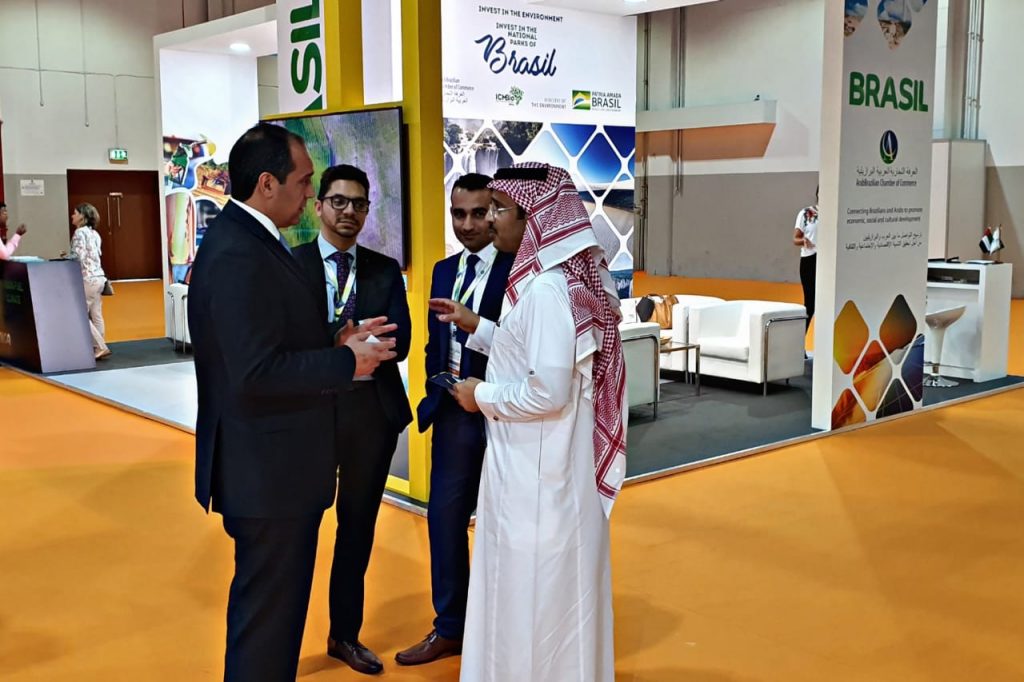São Paulo – Brazil’s Ministry of Environment presented its national park concessions project at Wetex, the water, energy, tech and environment show that wrapped up this Wednesday (23) in Dubai, UAE. The ministry was represented by its Ecotourism secretary, André Germanos (pictured above, on the left). He told ANBA that concessions for six parks will be awarded to Brazilian and non-Brazilian companies by the end of next year.
“Up until the end of this year, we are working on three concessions in South Brazil: Floresta Nacional de Canela (RS), Floresta Nacional de São Francisco de Paula (RS) and Parque Nacional da Serra Geral (RS-SC). For the second half of 2020, under the federal government’s Investment Partnerships Program (IPP), three units have been included: Parque Nacional do Iguaçu (PR), Parque Nacional de Jericoacoara (CE) and Parque Nacional dos Lençóis Maranhenses (MA),” said Germanos.
According to him, these are iconic parks with substantial visitor numbers. “Iguaçu gets 2 million visitors a year, Jericoacoara gets 800,000 and Lençóis gets almost half a million. Therefore, investors are coming in at very interesting visitor levels, and we expect substantive investments in these units,” the secretary said.
Germanos said joining Wetex was important in realizing that “this kind of sustainable investment is compatible with the portfolios of various companies, funds and family offices with growing environmental concerns. These are sustainable investments with good returns,” he said.
There are 334 national parks in Brazil, and according to the secretary, many get regular visitor numbers and some are already under concession to the private sector. “The government wants to expand and improve this concessions model, making it more attractive and allowing more creative freedom to investors, so that concession holders can invest in a fast and efficient way, with best practices, equipment and ideas to make these parks into big hubs of knowledge, environmental education and entertainment, with ecotourism activities,” he said.
The goal of the administration, according to Germanos, is not revenue. “We’re proposing a concession system where investors will not pay anything to the government in order to get the concession. And we will not meddle with the cash flow, we will not ask for any percentage from ticket sales. What we want is for investors to commit to a higher and more substantial level of investment in the short term. Within the first three years of concession, we want to see the heavier investing done so the parks will see all this positive impact right up front. That will enable visitor numbers to increase and really develop the whole region around the national park conservation units,” he said.
Germanos said the concessions project is underpinned by a study attesting that the bigger the visitor numbers, the more parks get preserved. “We’re working with the conviction that he who visits, conserves. By visiting, people begin to understand nature and be closer to it. That leads to knowledge and environmental education. This way we can get people to connect with the parks, and it becomes something relevant and important in their lives,” he said.
The secretary said the plan is for the concessions to bring in more visitors, and therefore more socioeconomic development to the areas surrounding the parks. “We have conservation units all over Brazil, and in many cases, the parks, forests and reserves are the only way to bring socioeconomic development to the surrounding communities. It’s a big virtuous cycle. A well-done concession, with investments done while observing protocols, the zoning and environmental rules, will enable all this nature and heritage to actually be better conserved,” he concluded.
Wetex
The Arab Brazilian Chamber of Commerce joined Wetex with a stand for the second year running, and a Brazilian ministry was present for the first time. Arab Chamber International Relations manager Fernanda Baltazar said the event yielded many good results. “It’s important to get the government behind us so we can look into this industry and work on it more and more, to be able to get Brazil into this niche whose impact on economies will only grow,” she said. According to the executive, even though the fair doesn’t get the biggest traffic, the contacts are high-level. “This was created by skilled people, by technicians and decision-makers in renewable energy,” he said.
The head of the Arab Chamber’s international office in Dubai, Rafael Solimeo, said Wetex yielded important contacts both for the Ministry of Environment and the Sugarcane Industry Union (Unica). “Generally speaking, the fair was very fruitful for both organizations. We were visited by companies from the UAE, Gulf countries, North Africa and Europe,” he said.
Translated by Gabriel Pomerancblum




